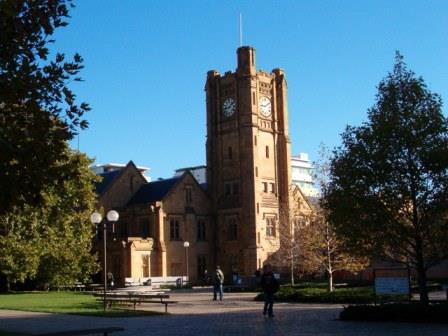Melbourne engineering professor receives award for cochlear implant
Professor Graeme Clark AC from the Melbourne School of Engineering is the first Australian to receive the US Russ Prize for an outstanding achievement in bioengineering innovation that is in widespread use to improve health and well-being: the cochlear implant.

The US National Academy of Engineering and Ohio University announced the winners of the biennial prize of US $500,000 today and recognised Professor Clark’s pioneering role in the development of the multi-channel cochlear implant for people with severe-to-profound deafness.
Professors Clark, Ingeborg and Irwin Hochmair from Austria and Michael Merzenich and Blake Wilson from the US are the pioneers in developing the multi-channel cochlear implant for giving speech understanding to severely-profoundly deaf adults and children.
Professor Clark, Honorary Professor, Electrical Engineering in the Melbourne School of Engineering who is a lead researcher at the University of Melbourne’s Centre for Neural Engineering, worked with a multi-disciplinary team at the University of Melbourne after he commenced cochlear implant research at the University of Sydney in 1967.
In the late 1970s, Professors Clark and Hochmair created prostheses that deployed multiple electrodes and routed particular sounds to different parts of the cochlear. These devices improved the ability of deaf people to understand speech.
Professor Clark also helped to create Cochlear Limited, the company that has dominated world markets for the last 30 years with over 320,000 patients implanted with the Australian device.
“I am honoured to have been given this award by the US National Academy of Engineering as it represents work that was developed through true multi-disciplinary teams in engineering and medicine to solve a major health issue.” Professor Clark said.
Professor Iven Mareels, Dean of the Melbourne School of Engineering said Professor Clark has made a significant difference to the lives of the severely and profoundly deaf.
“His work has inspired a whole generation of engineers to work in the development of new technologies to improve health,” he said.
Past winners of the Russ prize include
- Earl Bakken and Wilson Greatbatch who pioneered the implantable pacemaker;
- Willem Kolff who invented the artificial kidney and is considered the father of artificial organs;
- Leland Clark developed the first device to determine the amount of glucose in the blood for diabetics and considered the father of biosensors.
University of Melbourne Audiology School
The Department of Audiology and Speech Pathology at the University of Melbourne has developed to be a leading international player in hearing research, largely due to its role in the development and improvement of cochlear implants and their application. The cochlear implant now provides hearing to more than 100,000 completely or profoundly deaf people in more than 60 countries around the world.
Melbourne Audiology School’s Master of Clinical Audiology focuses on developing professional skills through a large program component of comprehensive clinical training. Clinical skills are supplemented by coursework and lectures that introduce students to graduate-level research methods, while maintaining a strong level of scientific acumen expected of students in the health sciences at the University of Melbourne.
Program: Master of Clinical Audiology
Location: Parkville campus, Melbourne, Victoria
Semester intake: February
Duration: 2 years
Apply to the University of Melbourne Audiology School!
*

































Ask A Question
Ask us about your program of interest, or if you have a question about our services.
CONTACT US TODAY